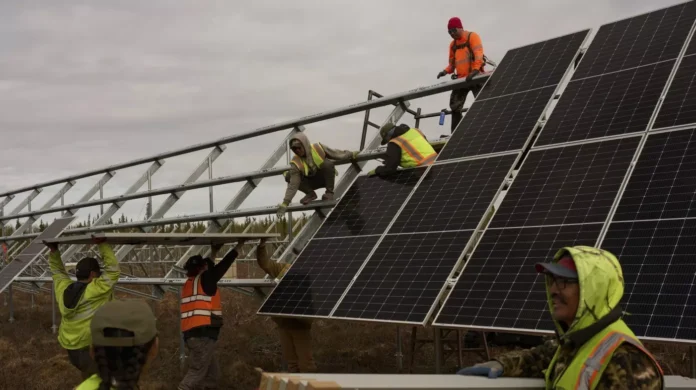The Agriculture Department has recently announced that it will be reducing its support for solar and wind energy projects on farmlands. In a statement released by Agriculture Secretary Brooke Rollins on the social media platform X, the department stated that it will no longer be funding solar or wind projects on productive farmland, putting an end to what they referred to as “massive taxpayer handouts.” This decision has sparked a debate among environmentalists and farmers, with some applauding the move while others expressing concern over the future of renewable energy in the agricultural sector.
The department’s decision comes after years of providing financial support for solar and wind energy projects on farmlands. These initiatives were aimed at promoting clean energy and reducing the carbon footprint of the agricultural sector. However, the department now believes that it is time to shift its focus towards other forms of renewable energy and put an end to the practice of using productive farmland for energy production.
In a statement released on Tuesday, the department clarified that this decision does not mean a complete halt to all renewable energy projects on farmlands. Instead, it will be focusing on alternative forms of renewable energy, such as biofuels and geothermal energy, which do not require the use of productive farmland. This move is in line with the department’s goal of promoting sustainable and responsible energy practices in the agricultural sector.
The decision has been met with mixed reactions from various stakeholders. Environmentalists have expressed their disappointment, stating that this move will hinder the progress towards a greener and more sustainable future. They argue that solar and wind energy are crucial in reducing greenhouse gas emissions and mitigating the effects of climate change. They also point out that using farmlands for energy production has its benefits, such as providing additional income for farmers and reducing their dependence on traditional farming practices.
On the other hand, some farmers have welcomed the decision, stating that it will allow them to focus on their primary goal of producing food. They argue that using farmlands for energy production can be a risky and time-consuming venture, which can affect their crop yields. They also express concerns over the potential damage that solar and wind energy projects can cause to the soil and surrounding ecosystems.
While the decision may be met with differing opinions, it is essential to understand the reasoning behind it. The Agriculture Department has stated that its primary concern is the protection of productive farmland. With the increasing demand for food production to feed a growing population, it is crucial to preserve and utilize farmlands for their intended purpose. The department believes that by shifting its focus towards other forms of renewable energy, it can strike a balance between promoting clean energy and ensuring food security.
Moreover, the department’s decision is not a complete rejection of solar and wind energy. It is a call for innovation and the exploration of alternative forms of renewable energy that can coexist with agriculture. Biofuels, for example, can be produced from crops grown on non-productive farmland, providing a win-win situation for both the environment and farmers.
In conclusion, the Agriculture Department’s decision to curtail its support for solar and wind energy on farmlands may have sparked a debate, but it is a step towards promoting sustainable and responsible energy practices in the agricultural sector. It is a call for innovation and finding a balance between clean energy and food production. As we move towards a greener future, it is essential to consider all factors and work towards a solution that benefits both the environment and the agricultural sector.

